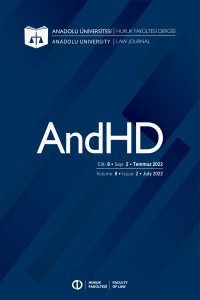Uzaktan Öğretim Tezsiz Yüksek Lisans Programlarının Finansmanı
Covid-19 adı verilen salgının pandemi boyutuna ulaştığı ve bütün şiddetiyle hüküm sürdüğü içinde bulunduğumuz dönemde, sadece yükseköğretim kurumlarında değil tüm eğitim-öğretim kademelerinde uzaktan öğretim uygulanır hale gelmiştir. Bu ortamda yükseköğretim kurumlarında yüksek lisans programlarının yürütüldüğü enstitülerde uzaktan öğretim tezsiz yüksek lisans programlarına yönelik talep de artmıştır. Bu programların tezsiz oluşu ve giriş koşullarının tezli yüksek lisans programlara göre daha kolay olması da bu artışta etkili olan unsurlardır.
Bu çalışmada; uzaktan öğretim tezsiz yüksek lisans programlarında öğrencilerden alınan öğrenim ücretini belirleme yetkisinin kimde olduğu ve ilgili mevzuatta verilen yetkiye uygun belirleme yapılıp yapılmadığı konusu ele alınacaktır. Ayrıca, öğrencilerden alınan öğrenim ücretleri gelirlerinin programı yürütenlere hangi oranda ve ne şekilde ödeneceği, kalan gelirlerin yükseköğretim kurumunun hangi harcamalarında kullanılabileceği konularına değinilerek görülen sorunlara ilişkin önerilerde bulunulacaktır.
Anahtar Kelimeler:
Yükseköğretim Mevzuatı, Tezsiz Yüksek Lisans Programları, Öğrenim Ücretleri, Uzaktan Öğretim, Yükseköğretim Kurum Harcamaları
Financing of Distance Learning Master’s Programs Without Thesis
In the period when the Covid-19 epidemic has reached the pandemic dimension and prevails with all its violence, distance education has become applicable not only in higher education institutions but also in all levels of the education system. In this environment, the demand for distance education master programs without a thesis has also increased in higher education institutions. The fact that these programs are non-thesis and that the entry requirements are easier than the master’s programs with thesis are the factors that contribute to this increase.
In this study, the issue of who has the authority to determine the tuition fee received from the students in the distance education master’s programs without a thesis and whether the determination has been made in accordance with the authority given in the relevant legislation will be discussed. In addition, it will be mentioned in what proportion and how the tuition fees received from the students will be paid to those who run the program, and in which expenditures of the higher education institution the remaining income will be used, and suggestions will be made regarding the problems seen.
Keywords:
Higher Education Legislation, Non-Thesis Master’s Programs, Tuition Fees, Distance Education, Higher Education Institution Expenditures,
- Yayın Aralığı: Yılda 2 Sayı
- Başlangıç: 2015
- Yayıncı: ANADOLU ÜNİVERSİTESİREKTÖRLÜĞÜ
Sayıdaki Diğer Makaleler
Türk Hukukunda Saldırgan Satış Yöntemleri
Anayasa Mahkemesi Tarafından Siyasi Partilerin Dağılma Durumunun Tespit Edilmesi
Milletlerarası Özel Hukuku Sevdiren Nedir? Bir Makalenin Düşündürdükleri
Hasan Hüseyin BAYRAKLI, Ahmet BOZDAĞ
Bosphorus Hava Yolları Turizm ve Ticaret Anonim Şirketi v. İrlanda Davası
Amerikan Hukuk Sistemini Yerel Siyaset Üzerinden Okumak
Ceza Muhakemesinde Objektif Bir Taraf Olarak Savcılık Makamı
Uzaktan Öğretim Tezsiz Yüksek Lisans Programlarının Finansmanı
